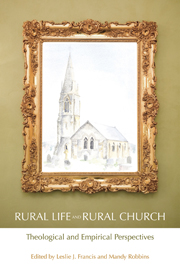Book contents
- Frontmatter
- Contents
- Preface
- Foreword by The Bishop of Shrewsbury, The Rt Revd Mark Rylands
- 1 Introduction: shaping rural theology
- PART 1 PERSPECTIVES FROM THE BIBLE
- PART 2 PERSPECTIVES FROM ORDINARY THEOLOGY
- PART 3 THEOLOGICAL AND SOCIOLOGICAL PERSPECTIVES
- PART 4 HISTORICAL PERSPECTIVES
- PART 5 LISTENING TO VISITORS
- PART 6 LISTENING TO THE COMMUNITY
- PART 7 LISTENING TO CHURCHGOERS
- PART 8 LISTENING TO CHURCH LEADERS
- 24 Deployment of the churches' ministry: Anglicans and Methodists in a rural diocese
- 25 Views on baptism and confirmation in the Church in Wales: are rural clergy different?
- 26 Children and communion: listening to churchwardens in rural and urban Wales
- PART 9 SATISFACTION AND STRESS IN MINISTRY
- Contributors
- Sources
- Subject Index
- Name Index
25 - Views on baptism and confirmation in the Church in Wales: are rural clergy different?
from PART 8 - LISTENING TO CHURCH LEADERS
- Frontmatter
- Contents
- Preface
- Foreword by The Bishop of Shrewsbury, The Rt Revd Mark Rylands
- 1 Introduction: shaping rural theology
- PART 1 PERSPECTIVES FROM THE BIBLE
- PART 2 PERSPECTIVES FROM ORDINARY THEOLOGY
- PART 3 THEOLOGICAL AND SOCIOLOGICAL PERSPECTIVES
- PART 4 HISTORICAL PERSPECTIVES
- PART 5 LISTENING TO VISITORS
- PART 6 LISTENING TO THE COMMUNITY
- PART 7 LISTENING TO CHURCHGOERS
- PART 8 LISTENING TO CHURCH LEADERS
- 24 Deployment of the churches' ministry: Anglicans and Methodists in a rural diocese
- 25 Views on baptism and confirmation in the Church in Wales: are rural clergy different?
- 26 Children and communion: listening to churchwardens in rural and urban Wales
- PART 9 SATISFACTION AND STRESS IN MINISTRY
- Contributors
- Sources
- Subject Index
- Name Index
Summary
Abstract – A survey of all Church in Wales stipendiary parochial clergy sought clerics' views on various aspects of baptism and confirmation. A 65% response produced data to suggest that 58% of the respondents serve in urban parishes and 42% in rural parishes. The views of urban and rural clerics were found to show statistically significant differences in respect of eleven key items on baptism and confirmation. These data support other research suggesting that rural clergy are more community orientated and probably more sensitive to the conservative views of parishioners.
Introduction
The difficulties of attempting to divide Anglican clergy into two clear categories according to whether they minister in a rural or an urban parish are well documented. Factors designed to identify ‘rurality’ were presented by Francis (1985) and further developed by Lankshear (2001). Littler (2005) has presented a working definition of the ‘rurality’ of each Church in Wales diocese using figures for population per parish and the number of parishes per diocese. It remains, however, that no official theory or figures are available for the designation of either Church of England or Church in Wales parishes according to whether they may be deemed rural or urban and it has to be accepted that the distinction between ‘rural’ and ‘urban’ remains imprecise (Burton, 2004).
Despite these difficulties there is considerable evidence, both anecdotal and empirical, to suggest that the experience of Anglican clergy in rural parishes differs from the experience of clergy in urban parishes. Osborne (2004), for example, argues that while all Anglican clergy, urban or rural, have to face a clash of myth and reality concerning their role in the community, this is probably more pronounced in respect of the country vicar.
- Type
- Chapter
- Information
- Rural Life and Rural ChurchTheological and Empirical Perspectives, pp. 299 - 304Publisher: Acumen PublishingPrint publication year: 2012

